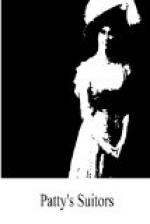Patty listened, enthralled. She loved this sort of thing, and she knew he was playing to her and for her. The strains would be now softly romantic, now grandly triumphant, but ever recurring to the main motive, until one seemed fairly to see the fickle maiden of the song.
When it was ended, the room rang with applause. Cameron bowed simply, and laying aside his violin, went straight to Patty and sat down by her, coolly appropriating the chair which his cousin Marie had just left.
“I made that for you,” he said, simply. “Did you like it?”
“Like it!” exclaimed Patty, her blue eyes dancing; “I revelled in it! It was wonderful! Was it really impromptu?”
“Of course. It was nothing. Any one can play variations on an old song.”
“Variations nothing!” remarked Patty. “It was a work,—a chef d’oeuvre,—an opus!”
“Yes; Opus One of my new cycle.” “What are you two talking about?” said Marie, returning. “Have you found your girl, Kit? What do you think, Patty?—Kit’s crazy over a black-eyed girl whom he doesn’t know!”
“Is he?” said Patty, dropping her eyes demurely.
“I found My Girl, Marie,” Cameron announced, calmly; “I find I made a trifling mistake about her colouring, but that’s a mere detail. As it turns out, the lady of my quest is Miss Fairfield.”
“Good gracious, are you, Patty?” said Marie, impetuously; “are you Kit’s girl?”
“Yes; I am,” and Patty folded her hands with a ridiculous air of complacency.
“Patty!” growled Van Reypen, who was sitting behind her.
“Yes, Philip,” said Patty, sweetly, turning partly round.
“Behave yourself!”
“I am behaving, Philip,” and Patty looked very meek.
“Of course you are,” said Marie; “you’re behaving beautifully. And you look like an angel, and you sang like a lark, and if you’re Kit’s Girl, I’m glad of it. Now come on, everybody’s going to supper.”
“You come along with me,” said Philip Van Reypen, as he took Patty by the arm.
“Why?” And Patty looked a little defiant at this command.
“Because I want you to. And I want you to stop making up to that Cameron man.”
“I’m not, Philip; he’s making up to me.”
“Well, he’d better stop it! What was he doing on his knees before you in the library?”
“I don’t remember,” said Patty, innocently. “Oh, yes, he was telling me my cheeks were red, or some foolishness like that.”
“And your eyes were blue, I suppose, and your hair was yellow! Didn’t you know all those things before?”
“Why, Philip, how cross you are! Yes, I’ve known those things for nineteen years. It’s no surprise to me.”
“Patty, I’d like to shake you! Do you know what you are? You’re just a little, vain, silly, babbling coquette!”
“I think that’s a lovely thing to be! Do you want me to babble to you, Philip, or shall I go and babble to somebody else?”




